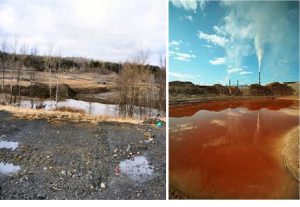
Polyaromatic hydrocarbons (PAH) are a group of aromatic hydrocarbons with at least two benzene nuclei, which are mainly formed during the incomplete combustion of fossil and organic fuels. Important sources of pollution with polyaromatic hydrocarbons are industrial enterprises (chemical plants, smelters, power plants, heating plants), but also combustion engines of vehicles or individual heating. A large part of PAHs are mutagenic and carcinogenic substances.
In experiments on animals, adverse effects on the skin, blood formation, damage to the respiratory and immune systems, reproduction, etc. were observed.
In cooperation with colleagues from Hungary, we proposed a procedure for the revitalization of PAH-polluted soils using special enzymes and HUMAC® Agro. The process can be divided into two phases:
1st phase: Soil remediation using enzymes capable of breaking down PAHs. Specifically, it concerns the application of BOOS-BS ENZYMMIX, a specially formulated enzyme solution for PAH degradation.
2nd phase: Rehabilitation of the soil using a soil conditioner based on humic acids, which can return all the necessary components to the soil and support plant growth. For this purpose, HUMAC® Agro is the ideal fertility stimulant to revive degraded soils.
Both phases are described in more detail below:
Phase 1 Soil remediation
In the first step, it is necessary to remove PAH from the soil. One of the simplest methods is the enzymatic decomposition of these substances. Soil decontamination can be carried out “in-situ” without the need to excavate the soil and haul it away, simply by spraying the contaminated soil with an aqueous enzyme solution. The prepared solution can be applied by spraying to the entire contaminated area. It is most suitable to ensure uniform spraying of the area, for example, by using agricultural irrigation systems. It is advisable that the soil does not dry out during the entire period, and it is also advisable to plan the application for a period without heavy rainfall, as rain would reduce the necessary concentration of enzymes.
Enzymes in the soil degrade slowly and decompose PAHs even several weeks after their application.
Phase 2 Soil rehabilitation
After achieving the desired results of soil contamination after phase 1, it is necessary to return all necessary nutrients to the soil, improve soil quality and promote plant growth. For this purpose, a soil conditioner based on activated natural humic substances HUMAC® Agro is used.
One of the most fundamental factors affecting soil fertility and soil aggregate stability is the quantity and quality of organic matter in the soil. The decisive role is mainly played by its stable form composed of mainly humic substances, including humic acids. Remediation of degraded soils cannot be done without the addition of humic acids, no amount of mineral fertilizers alone will restore lifeless soils.
We will update the test results soon.
